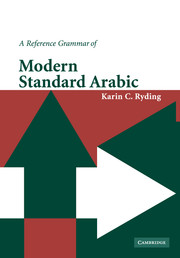Book contents
- Frontmatter
- Contents
- Preface
- List of Abbreviations
- Acknowledgments
- 1 Introduction to Arabic
- 2 Phonology and script
- 3 Arabic word structure: an overview
- 4 Basic Arabic sentence structures
- 5 Arabic noun types
- 6 Participles: active and passive
- 7 Noun inflections: gender, humanness, number, definiteness, and case
- 8 Construct phrases and nouns in apposition
- 9 Noun specifiers and quantifiers
- 10 Adjectives: function and form
- 11 Adverbs and adverbial expressions
- 12 Personal pronouns
- 13 Demonstrative pronouns
- 14 Relative pronouns and relative clauses
- 15 Numerals and numeral phrases
- 16 Prepositions and prepositional phrases
- 17 Questions and question words
- 18 Connectives and conjunctions
- 19 Subordinating conjunctions: the particle ʾinna and her sisters
- 20 Verb classes
- 21 Verb inflection: a summary
- 22 Form I: The base form triliteral verb
- 23 Form II
- 24 Form III triliteral verb
- 25 Form IV triliteral verb
- 26 Form V triliteral verb
- 27 Form VI triliteral verb
- 28 Form VII triliteral verb
- 29 Form VIII triliteral verb
- 30 Form IX triliteral verb
- 31 Form X triliteral verb
- 32 Forms XI–XV triliteral verb
- 33 Quadriliteral verbs
- 34 Moods of the verb I: indicative and subjunctive
- 35 Moods of the verb II: jussive and imperative
- 36 Verbs of being, becoming, remaining, seeming (kaan-a wa-ʿ axawaat-u-haa)
- 37 Negation and exception
- 38 Passive and passive-type expressions
- 39 Conditional and optative expressions
- Appendix I: How to use an Arabic dictionary
- Appendix II: Glossary of technical terms
- References
- Index
2 - Phonology and script
Published online by Cambridge University Press: 05 May 2012
- Frontmatter
- Contents
- Preface
- List of Abbreviations
- Acknowledgments
- 1 Introduction to Arabic
- 2 Phonology and script
- 3 Arabic word structure: an overview
- 4 Basic Arabic sentence structures
- 5 Arabic noun types
- 6 Participles: active and passive
- 7 Noun inflections: gender, humanness, number, definiteness, and case
- 8 Construct phrases and nouns in apposition
- 9 Noun specifiers and quantifiers
- 10 Adjectives: function and form
- 11 Adverbs and adverbial expressions
- 12 Personal pronouns
- 13 Demonstrative pronouns
- 14 Relative pronouns and relative clauses
- 15 Numerals and numeral phrases
- 16 Prepositions and prepositional phrases
- 17 Questions and question words
- 18 Connectives and conjunctions
- 19 Subordinating conjunctions: the particle ʾinna and her sisters
- 20 Verb classes
- 21 Verb inflection: a summary
- 22 Form I: The base form triliteral verb
- 23 Form II
- 24 Form III triliteral verb
- 25 Form IV triliteral verb
- 26 Form V triliteral verb
- 27 Form VI triliteral verb
- 28 Form VII triliteral verb
- 29 Form VIII triliteral verb
- 30 Form IX triliteral verb
- 31 Form X triliteral verb
- 32 Forms XI–XV triliteral verb
- 33 Quadriliteral verbs
- 34 Moods of the verb I: indicative and subjunctive
- 35 Moods of the verb II: jussive and imperative
- 36 Verbs of being, becoming, remaining, seeming (kaan-a wa-ʿ axawaat-u-haa)
- 37 Negation and exception
- 38 Passive and passive-type expressions
- 39 Conditional and optative expressions
- Appendix I: How to use an Arabic dictionary
- Appendix II: Glossary of technical terms
- References
- Index
Summary
This chapter covers the essentials of script and orthography as well as MSA phonological structure, rules of sound distribution and patterning, pronunciation conventions, syllable structure, and word stress. Four features of Arabic script are distinctive: first, it is written from right to left; second, letters within words are connected in cursive style rather than printed individually; third, short vowels are normally invisible; and finally, there is no distinction between uppercase and lowercase letters. These features can combine to make Arabic script seem impenetrable to a foreigner at first. However, there are also some features of Arabic script that facilitate learning it. First of all, it is reasonably phonetic; that is, there is a good fit between the way words are spelled and the way they are pronounced. And secondly, word structure and spelling are very systematic.
The alphabet
There are twenty-eight Arabic consonant sounds, twenty-six of which are consistently consonants, but two of which – waaw and yaaʾ – are semivowels that serve two functions, sometimes as consonants and other times as vowels, depending on context. For the most part, the Arabic alphabet corresponds to the distinctive sounds (phonemes) of Arabic, and each sound or letter has a name. Arabic letter shapes vary because Arabic is written in cursive style, that is, the letters within a word are systematically joined together, as in English handwriting. There is no option in Arabic for “printing” or writing each letter of a word in independent form.
Information
- Type
- Chapter
- Information
- A Reference Grammar of Modern Standard Arabic , pp. 10 - 43Publisher: Cambridge University PressPrint publication year: 2005
